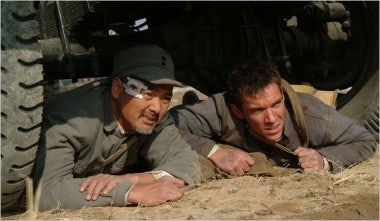Australian China Screen Alliance, Subsidiary Of The Screen Producers Association of Australia, To Smooth Path Into Chinese Market#

Roger Spotiswoode's 2008 film "The Children of Huang Shi" is considered the "first de facto Sino-Aussie co-production" (Image: New York Times)
As producers around the world look to get a piece of the rapidly growing Chinese film market -- which is on track to become the world's second-largest by 2015 -- we're seeing an increase in the number of cooperative exchanges taking place and business alliances forming. Recently, the U.S.-China Film Summit in Los Angeles brought together 500 film industry professionals, who discussed a range of issues from WTO regulations to potential opportunities for cooperation. Though attendees were quick to concede that it will likely take years for Chinese films to find a broader audience in the U.S. -- which has "the hardest borders in the world," according to former Fox executive Bill Mechanic -- the potential for co-productions is there.
But cross-border cooperation isn't limited to China and the U.S. Australian filmmakers are also looking to make inroads into the Chinese market (and vice versa). As the Hollywood Reporter points out today, looking to capitalize on a three-year-old co-production treaty between Australia and China, Aussie filmmakers recently formed the Australian China Screen Alliance, a subsidiary of the Screen Producers Association of Australia, which aims to "speed and smooth interaction with the fastest-growing film market in the world." From the article:
In a country where most of the biggest imports still come from Hollywood, the SPAA wants the Australia-based alliance to partner with China-based filmmakers’ groups to work together to take advantage of a box office that will soon shatter its 2009 record of $909 million in ticket sales.
Already, the Xi'an Qujiang Film and TV Investment Group in central China has taken a step in this direction, recently signing an agreement to establish their own chapter of the Australian China Screen Alliance.
At first, the Alliance will act in an advisory capacity and play matchmaker between Australian producers looking for partners based in China, people who can co-produce, provide resources, direct consultations and facilitate dialogue between the two filmmaking communities.
SPAA executive director Geoff Brown said that the Chinese appetite for international co-production is growing rapidly along with the economy.
As the article goes on to note, part of the benefit that this alliance would bring to Australian filmmakers is a way to sidestep Beijing's current cap of 20 imported films per year -- a regulation that has frustrated international production companies since China's WTO accession nearly a decade ago:
Most co-productions in China now come from Hong Kong, whose filmmakers enjoy favorable import terms and have the advantage of a shared culture. Sino-Aussie co-production imports would, like co-prods from Hong Kong, avoid Beijing’s annual 20-film import cap on foreign titles allowed to give a share of their gross back to the copyright holders.
Australia’s not the only country to set its sites on China’s huge movie market, with France, Singapore and New Zealand all signing treaties of their own with Beijing in the last eight months. Still, the SPAA’s Brown is confident about Australia’s jump in China: “I believe we have about a three-year window before it becomes a massively competitive field with other countries.”
Expect to hear more about the Australian China Screen Alliance at the upcoming Australia-China Film Industry Forum, which will take place in Beijing between Dec. 8-12 as part of "Imagine Australia," the year of Australian Culture in China.